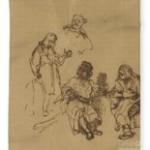The Ninevites were the cruel kids in the ancient Near East. They were feared and hated. And they richly deserved it.
Despite that reputation, God tells Jonah to let them know that they are in danger of judgment. The Hebrew literally reads, “A prophetic message from God came to be with Jonah…”[1] It wasn’t a whisper. It wasn’t a suggestion. It wasn’t a nagging thought. It was a big, ugly certainty. And Jonah knew it.
The story is also clear. Jonah just runs. And he runs in the exact – opposite – direction, traveling first to Joppa and then paying his fare for a boat to Tarshish. Joppa was 550 miles southwest of Nineveh and Tarshish was 2500 miles west, northwest from Joppa. 3050 miles. That’s a lot of running, particularly in the ancient world.
But Jonah is not running from Nineveh, the story tells us. He is running from “the presence of the Lord.” And that’s always the case, isn’t it? The issue isn’t what God wants us to do, per se. The problem is that it is God who wants us to do it. And we don’t wanna.
And we often do run. From place to place. From situation to situation. From relationship to relationship. I am not suggesting that there isn’t time and place to move on. Even Jesus told his disciples that there was a time and place to kick off the dust from their sandals. And I counseled battered wives to move on immediately with their children and find a safe place.
But we have all had challenges that we didn’t want to face where running seemed like the best solution. I knew a pastor who even ran from church to church, using her skills – successfully! – to heal sick congregations. But when she finally found a congregation that she couldn’t heal, she was shattered emotionally and spiritually. It was only then that she discovered that what drove her was a childhood experience that led her to believe that it was her responsibility, not God’s to heal the world around her.
Of course, we don’t always resist God by running – physically.
Sometimes we exalt other priorities. “God, you know how bad they are.” “God, you know how evil their behavior is.” “You know how wrong they are.” What you want me to do isn’t important. These people should be silenced, shunned, punished – or, at the very least – they are not getting my love.
I think we may be living in a cultural moment like that right now. “Hater’s are gonna hate,” so the expression goes. But if you ask me, it looks like hate is an equal-opportunity-employer. And everyone is taking a turn at hating.
Family members are cutting off one another. Friendships are burned to the ground. And civil discourse isn’t civil enough for discourse.
We have a prosperity problem, friends, and it has given us the burden of looking for meaning by demonizing our neighbor — and the luxury of doing it because we aren’t paying a price for it. But the day is coming – and it may not be far off – and maybe it is here already — when this country may need to pull in one direction and won’t be able to find the unity it needs.
There are other kinds of running, of course. Sometimes we run by attributing our priorities to God. “God’s politics are my politics.” “Jesus loves you, but I’m his favorite.”
Other times, we try requesting a postponement. “I am sure there is a better time for this.” “Check back with me later, God.” Even St. Augustine as a young man confessed “Oh, Master, make me chaste and celibate – but not yet!”[2]
But no matter how we run or how far we run what we discover is that there is no escaping the consequences of our choices. We can travel 3050 miles, we can offer 3050 excuses, we can ask for 3050 postponements. But “Wherever we go, there we are.”
In Jonah’s case the consequences take the form of “a great wind upon the sea” that the Lord hurls at him. There isn’t much point asking whether this means that God causes weather – or uses weather. This isn’t a lesson in meterology. This is an ancient campfire tale, and they don’t do science or theories of causation in campfire tales. They do drama. And in this case the drama is a face-off between Jonah and his God. So, the story naturally moves Jonah and God to the forefront of the plot and they are in the leading roles.
The significance of the storm, then, is this: Every time we run from God, chaos will follow us, and a change in geography or jobs won’t resolve anything. The big winds and high water represent that life-threatening chaos.
But the waves can represent any number of things: the hardships we experience, the self-sabotage that undermines us, the hard places we put ourselves in when we try to be our own gods — the struggles we experience before we find some measure of spiritual maturity, the interior disquiet that accompanies doing something we know we shouldn’t do – or, as Paul put it, the discomfort we experience when we don’t do what we know we should do.
Jonah is being willfully disobedient. But the ancient teachers of the church knew that it just isn’t sin that gets in the way of our listening to God, it is also our need to grow up and come to grips with our relationship with God. And that, not the absence of conflict, is the key to real peace.
In Jonah’s case, his unbelieving crew doesn’t even need to share his faith to see this. They cast lots and it falls on Jonah – probably like a ship’s anchor. There he stands, completely exposed. And when he admits what he has done, the crew recognizes just how cosmically stupid this really is. He knows what God wants, he is on the run. He doesn’t even have an excuse.
“Pick me up and throw me into the sea; then the sea will quiet down for you, for I know it is because of me that this great storm has come upon you.” Under the heading of running from God, there is probably nothing as colossally stupid as last stand bravado. But here we have it.
We hear God. We ignore God. We know that our behavior is not only hurting us but those around us. And our response is, “I’m wrong, so shoot me.” “Cut me loose.” “Throw me overboard.”
In those moments when we think that kind of thing or we actually say it, I know that most of us are thinking. “You’ve beat me up long enough, God. I don’t care. I’m not going to care.” It is such a common thought that we celebrate it in books and film: The noble atheist, the disillusioned priest, the tortured anti-hero.
But the truth is, God isn’t beating us up. God has been trying to heal us all along. And the battering that we are experiencing isn’t God’s doing. The fatigue, frustration, and anger that we are feeling is the result of running away from God, instead of running with God.
When we realize this, Jonah’s words of bravado – and ours – aren’t the courageous words of someone who has battled God to a draw. They are the words of someone who refuses to let themselves find peace, when it has always been right there for the taking.
And that, not punishment, is what the “big fish” is all about:
So they picked Jonah up and threw him into the sea, and the sea ceased from its raging. Then the men feared the Lord even more, and they offered a sacrifice to the Lord and made vows.
But the Lord provided a large fish to swallow up Jonah, and Jonah was in the belly of the fish three days and three nights.
It’s popular to assume that the big fish is just one more punishment God inflicts on Jonah. But the Hebrew is interesting here. The big fish just doesn’t “happen” to be there, he is “provided”, “appointed”, “tasked” to swallow Jonah. And he isn’t the instrument of punishment. He is the instrument of deliverance.
Without the big fish, Jonah will drown, the victim of his own willful resistance. Angry, unrepentant, self-righteous.
If you were wondering who was the first parent to use “time out” as a way of giving a child an opportunity to rethink their behavior, this is it. And it is no surprise that millennia later the church would see the three days in the belly of the big fish as an image filled out in new ways by the three days Jesus spent in the tomb.
It isn’t just one of us, from time to time, that needs an opportunity to consider how destructive our behavior can be. There are times when the whole world could use a time out. And the early teachers of the church grasped this. We can run, but we can’t hide.
Life is not so much about what happens to us as it is about how we respond to God – whenever what happens, happens. And when we do run – whether it is willful or a result of spiritual immaturity – the unfinished business we have with God will continue to surface over and over again, until we turn and face it with God at our side.
It doesn’t matter whether it is prejudice, grudges, insecurity, fears, a lack of self-discipline, selfishness, narrowness, something else we have yet to learn, or spiritual injury at the hands of others. God is in the business of healing us, and if it doesn’t get done now, it will inevitably follow us wherever we go.
Don’t stop listening for the voice of God.
Examine your heart with God’s love and help.
Embrace the healing he has to offer.
And don’t ever run from his presence — because you can’t hide.
[1] Jack M. Sasson’s commentary in the Anchor Bible Commentary Series (vol. 66) provides a helpful conversation about the Hebrew of Jonah discussed throughout the article.
[2] https://faculty.georgetown.edu/jod/texts/sundayheraldreview.html














